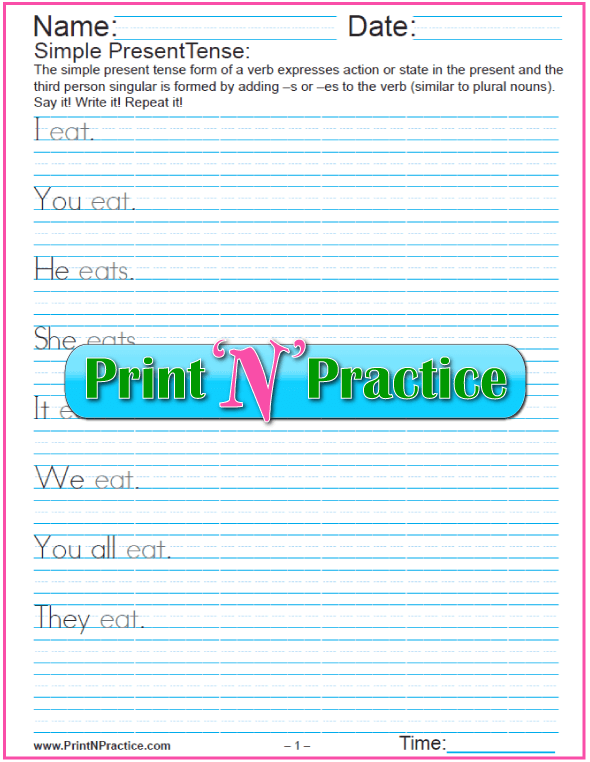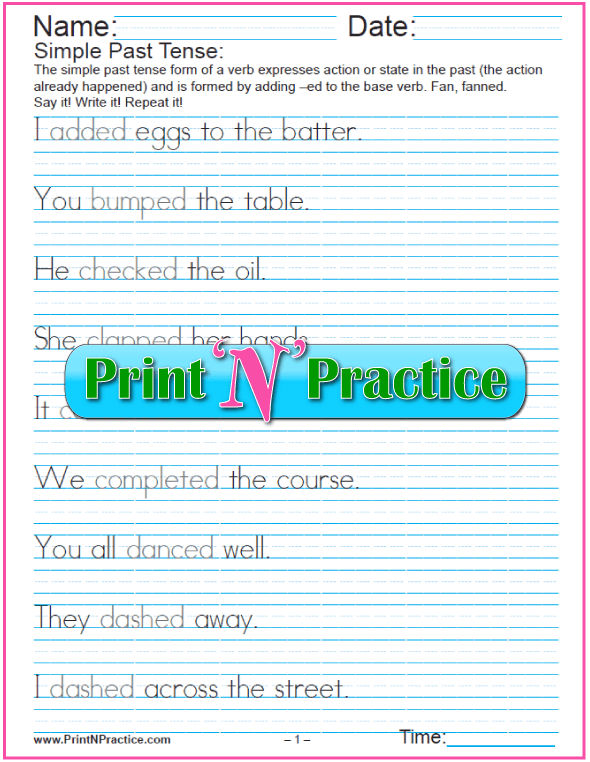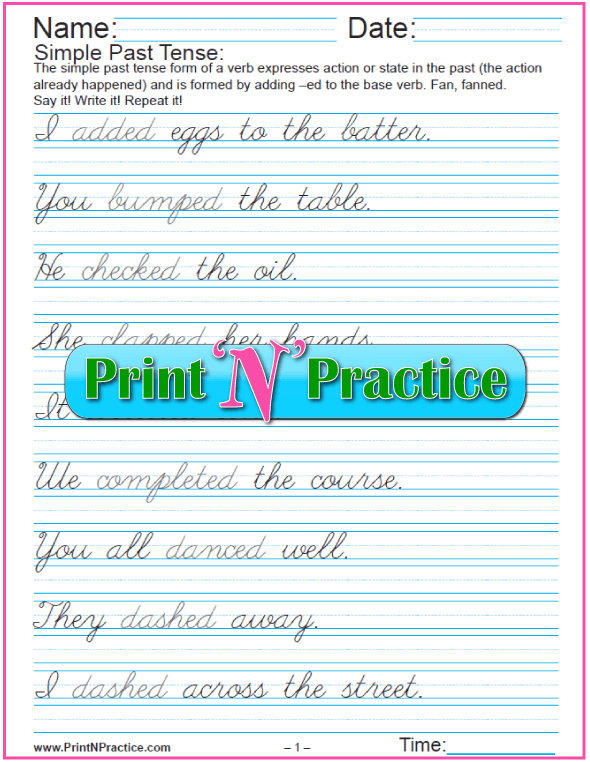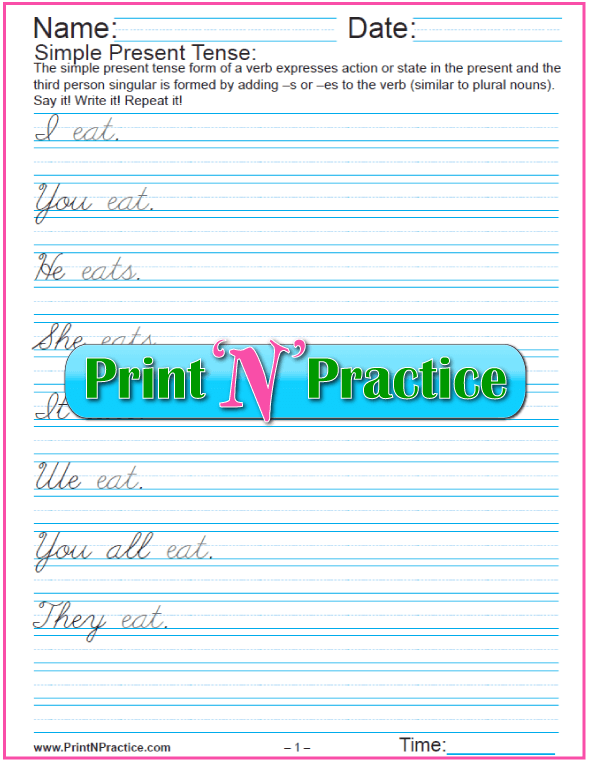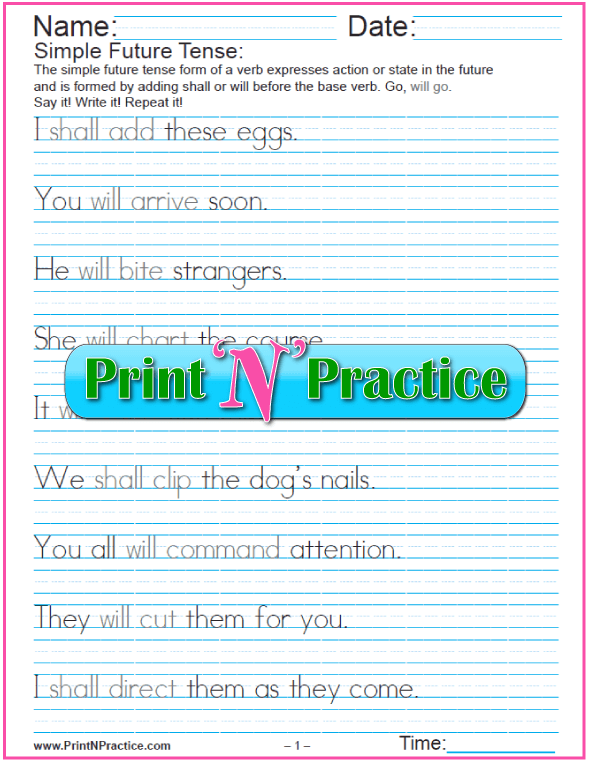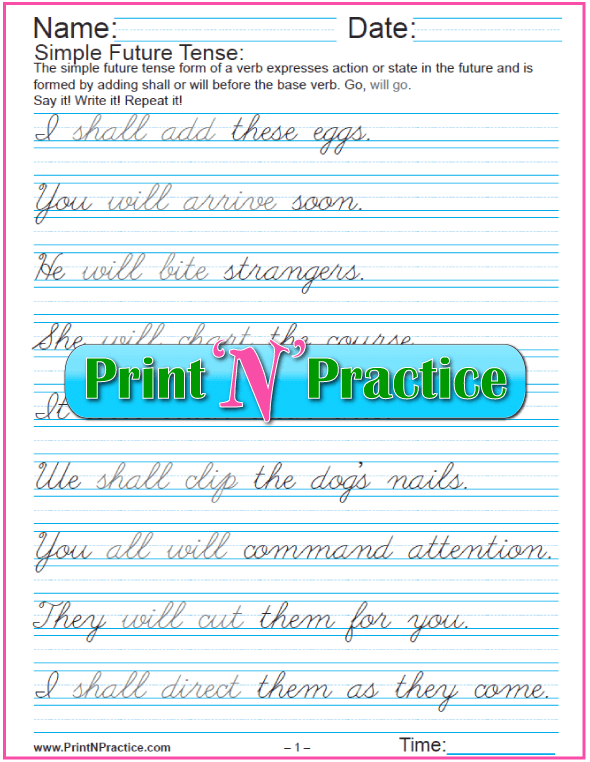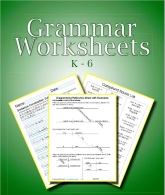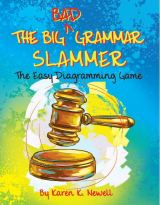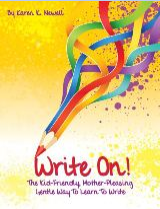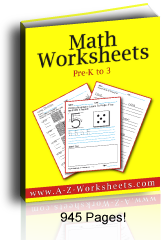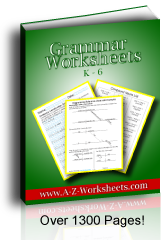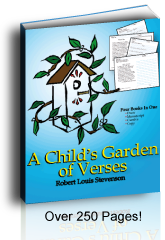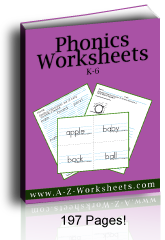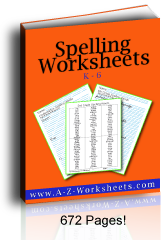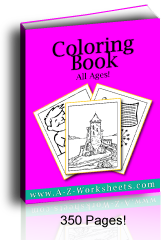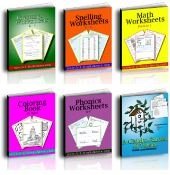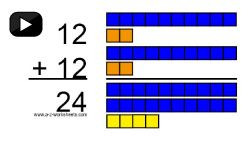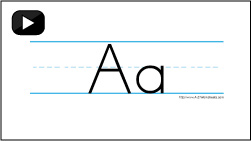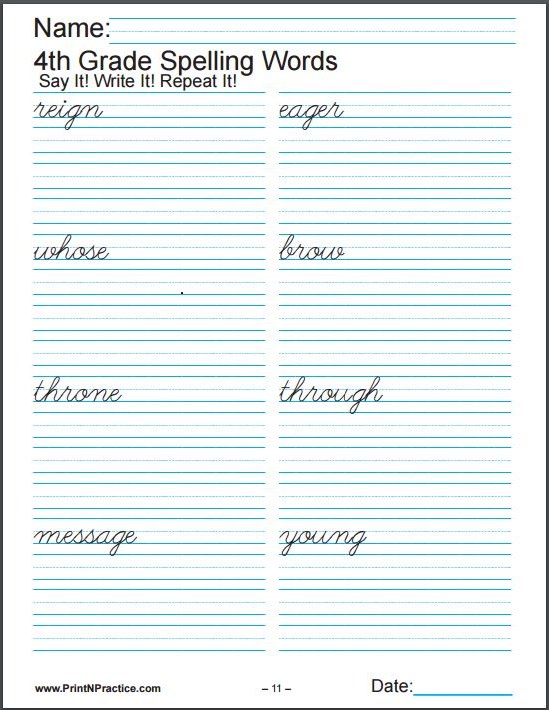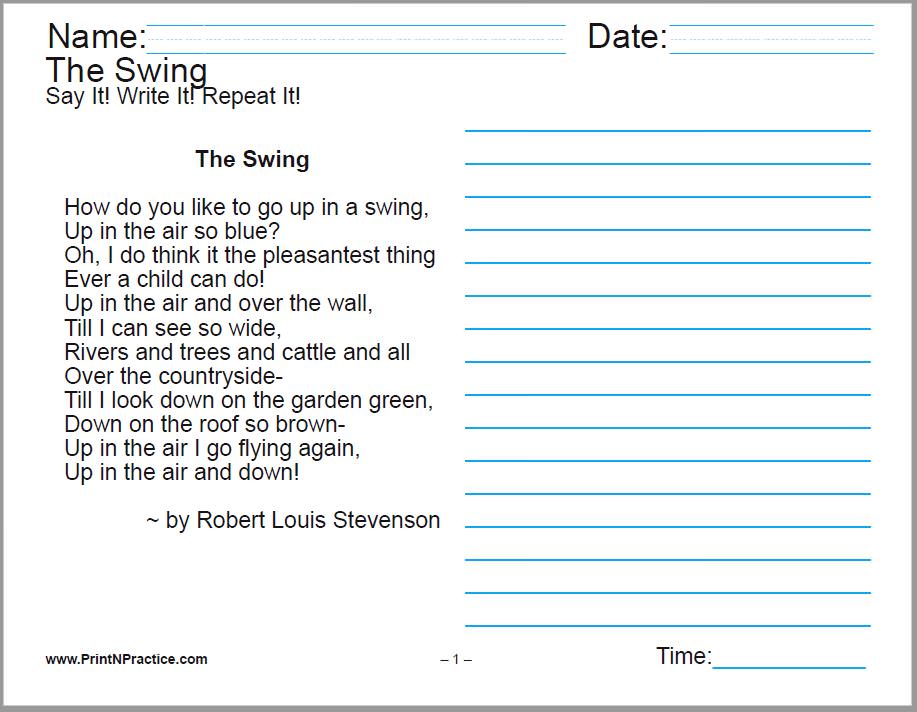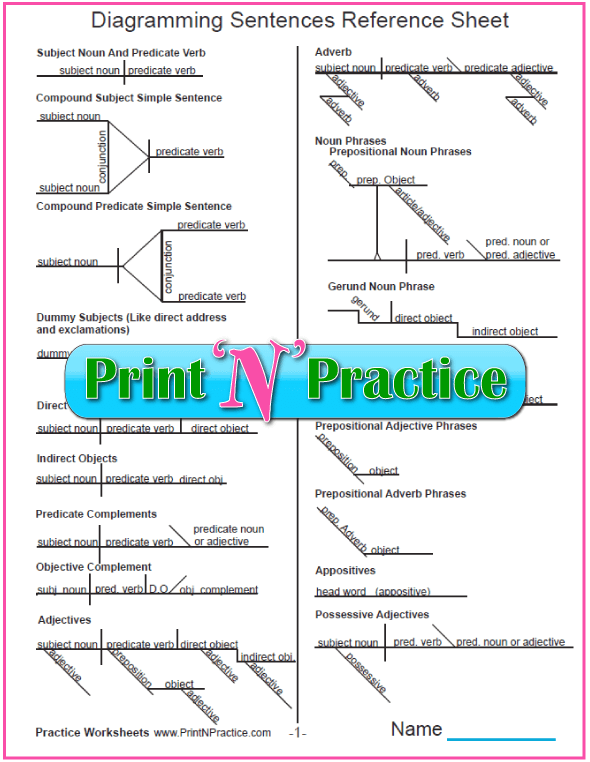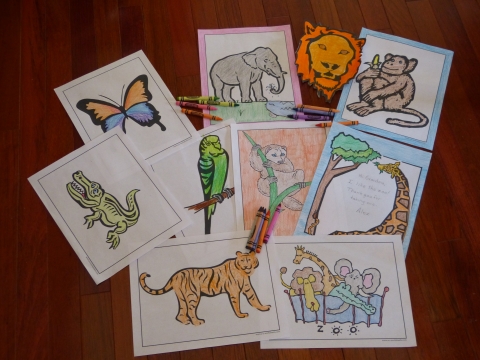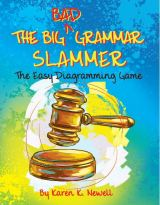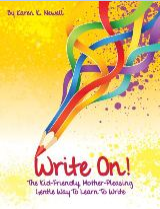Easy Sentences In English
Quick Practice That Kids Like
At the beginning it is best to start with easy sentences in English. These sentences have one clause, meaning one subject and one verb.
Below, you will find three sets of sentence worksheets: past, present, and future. Each has both manuscript and cursive examples.
When I'm teaching about the grammar of sentences I like to show the children the Subject and Verb parts of speech on a diagram that looks like a train.
It's super easy. If you keep the sentences short, the children will understand quickly. You can also use our diagramming pages so the children get the picture, the map of where the grammatical terms sit.
Be encouraged to stay in touch! Join my free newsletter....
Join To Receive My Free PrintNPractice Newsletters!
Free Online Worksheets For School, Homework, And Homeschool Practice
Free Online Teacher Resources - Free Homeschool Curriculum
For teachers and parents: PrintNPractice free printable worksheets are all copyright-free, digital activities for students. Use in homeschool, interactive notebooks for online classrooms, Google classroom, distance learning, tutoring and learning pods, and hybrid school.
- No prep.
- No tracking.
- Self learning.
- Copyright free.
- Lifetime license.
- Diverse learners.
- Easy drill-and-kill.
- Interactive worksheets.
- Printable morning work.
- Paperless morning work.
- Go printable or paperless.
- Stay on track. Summer review.
- Easy elementary school curriculum.
- Remote learning packets or homework.
- Most need no answer key or key is included.
- Videos for audio and visual learners. God bless headphones!
See free teacher, homeschool, digital interactive school-at-home learning exercises with no login, no sign-up, no voucher, no account, and no credit card. Loads of digital activities for device-based learning. As seen at TeachersPayTeachers.
Teaching Easy Sentences In English - Subject Verb
I like to start on the board or a sheet of paper with a tiny diagram. Show that the subject and the predicate verb sit on the main line with a descending line to separate them.
Write Subject on the left of the diagram and Verb on the right (at this time use verb as short for predicate).
Then have fun with it. Draw a train around the words with a Subject-engine and a Verb-tender car complete with coal in the tender.
Later you can show an Object-caboose. Keep it simple at the beginning while they learn the terms.
Subject = Doer
Verb = Action (State of being and tenses can be added for older children, too.)
The subject does the action. To restate,
"Doer acts."
"Subjects verb."
Then demonstrate several two word sentences. Two word examples are easier to create if you think of the plural third person.
Using the season or the children's favorites catches their attention:
- Flowers grow.
- Basketballs roll.
- Snow falls.
They'll remember the terms Subject and Verb if you repeat them often enough, and they'll remember them better if they will draw the diagrams and write the words on their own papers.
Of course, they'll really enjoy it if you suggest several subjects that they can use with their own verbs. Let them add in the articles and adjectives. And, oh, yes. The ever present, "I" sentences:
- I play.
- I eat.
- I run.
These give students a good idea of basic sentences. Advise the children to capitalize the first letter in a sentence and to choose an end punctuation: period, exclamation point, or question mark.
The main point to emphasize is that the words must make sense together.
Practice Writing Easy Sentences In English
You can teach the past, present, and future by putting tiny sentences in order of time: past, present, and future. I like to teach the tenses with a timeline.
These easy English sentence worksheets have three to five sheets in each download:
Past Tense Easy Sentences
Manuscript Easy Sentences
Cursive Easy Sentences
Present Tense Easy Sentences
Future Tense Easy English Sentences
Creating Better Sentences: Subject, Verb, Object
Kids love seeing the image of a train! And the similarity works for most of beginning Grammar.
Now add the object:
- I play ball.
- I eat apples.
- I run marathons.
Objects answer the question, "What?"
In the beginning it helps vastly if you model short examples of easy sentences in English, especially if you have ESL students. Then provide suggestions of several nouns and several verbs. Teach the capitalization and punctuation rules at the same time as you are teaching sentences. They like being able to see where a sentence begins and where it ends.
- I like to choose small words so the lesson teaches the parts of speech not spelling.
- Try asking for sentences about other people or their favorite things. Keep the sentences simple, short, and interesting.
- You can use all three tenses with older children. I like showing all three tenses on the board in columns organized by time (past, present, future) so that the children can see the chronological sequence.
- After several board exercises, assign the worksheets to review what you have taught. All they have to do is copy the easy sentences! Say it. Write it. Repeat.
See subject verb agreement here.
Next in learning order is practice adding adjectives and adverbs or making compound sentences and conjunctions.
Creating Different Kinds of Sentences
Declarative Sentences - A declarative sentence, according to USE, is a sentence that makes (declares) a statement and ends with a period.
Interrogative Sentences - An interrogative sentence, according to USE, is a sentence that asks a direct question and ends in a question mark.
Imperative Sentences - An imperative sentence, according to USE, is a sentence that gives a command (an entreaty, a warning, a prohibition, etc.) and ends with a period or an exclamation mark. Go. Fetch. Help me! Thou shalt not kill.
Exclamatory Sentences - An exclamatory sentence, according to USE (an exclamation), is a sentence that expresses a strong emotion and ends with an exclamation mark. Fire! I wish you a Happy Birthday! Grandma and Grandpa are coming for Easter!
See our punctuation worksheets here.
We have lots more manuscript and cursive writing worksheets that you can buy in our printable English Grammar Worksheets bundle to add to these easy English sentences.
You might also like our:
- Printable Diagramming Sentences Charts and Worksheets
- Printable Grammar Definitions Ebook
- Teach Grammar with a Timeline
* American English Grammar And Writing Worksheets
<< This download has my favorite grammar PDFs for practice in elementary and middle school grammar lessons.
If you like the samples on this page, you'll love the grammar download which includes diagramming charts and English Grammar Definitions ebook.
These are great for easy practice and for ESL students.
Get the set. And enjoy!
* Karen Newell's Grammar And Writing Worksheets
Fast way to teach basic grammar!
Simple step by step workbook.
* Elizabeth O'Brien's English Grammar Revolution
Elizabeth O'Brian has the best diagramming workbooks I've seen. Her website also has videos to go with each lesson.
Buy PDF Kids Printable Worksheets Organized By Topic In Complete Digital Bundles Or Learn More Below.

Mary Fifer, BSBA is webmaster, author, and researcher at PrintNPractice.com. She has created elementary school practice exercises using digital interactive worksheets. Printable and perfect for today's teachers, tutors, homeschoolers, and students!
Thank you for visiting and for sharing. :-)
Be encouraged to stay in touch! Join my free newsletter....
